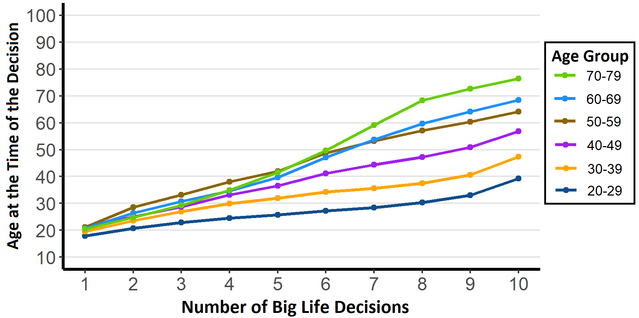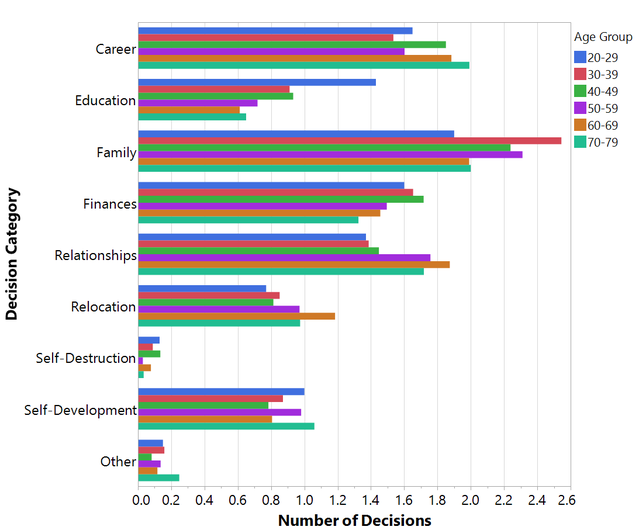Career
How Good Are You at Predicting Your Big Life Decisions?
New research reveals just how poor we are at predicting life’s biggest decisions
Posted March 7, 2021
It’s a truism to say that life is busy. But there really are so many short-term decisions to focus on. What restaurant to try this weekend? Which client to focus on at work? What birthday present to get for your friend?
We spend so much time thinking about short-term decisions that we almost never take the time to step back and reflect on those rarer but much more important decisions. The big decisions.
The question we’ll consider in this article is how good are we at predicting life’s biggest decisions? What will they be? When will they happen? And which big decisions will not seem so big in retrospect?

Life’s biggest decisions
I have spent my career studying decisions. A couple of years ago, I began to ask people to tell me about their biggest life decisions. In this blog, I share what I have learned.
As I have described in the first article in this series, big decisions can be placed into one of the following categories: Career, Education, Family, Finances, Relationships, Relocation, Self-Destruction, Self-Development, and Other. Each of these has a number of sub-categories. Some decisions are more likely during certain periods of life, which I have described in the second article in this series.
In addition to asking about their biggest past decisions, I encouraged people to predict their expected future big life decisions, including when those future big decisions would happen. Finally, I asked how many of their life’s ten biggest decisions they had already made.
When do people expect to make their biggest life decisions?
The figure below shows the age at which people expect to make their ten biggest life decisions, including those they have already made and well as those expected in the future. The results are split by the respondent’s age group to get a sense of how life experience affects expectations.

The first thing that stands out is that all of the lines incline upward. This makes perfect sense because the older we are the more big life decisions we will have made. Looking closely at the bottom-left of the chart, on average, people of all ages estimate that the first big life decision happens around the age of 19 or 20.
The second, and much more interesting, thing that stands out is that all of the different lines are separated. The line is steepest for the 70-79-year-olds (in green) and shallowest for the 20-29-year-olds (in dark blue), so let’s focus on these two age groups for now.
It’s important to keep in mind that, for the 70-79-year-olds, most of their big life decisions have already been made. As a result, what is plotted in the green are mostly recollections of past big decisions. In contrast, for the 20-29-year-olds, most of their big life decisions lay ahead. As a result, what is plotted in the dark blue are predictions of future big decisions.
So, how do the predictions of the 20-29-year-olds line up with the recollections of the 70-79-year-olds? Poorly. Those in their twenties expect most big life decisions to be made in the next decade and certainly none beyond the age of 40. By stark contrast, those in their seventies believe that by age 40, half of their big life decisions haven’t yet occurred, and big life decisions continue to happen well into their seventh decade.
Looking at the results as a whole, there seems to be a common theme that people just can’t imagine making any big life decisions more than 10, or perhaps 15, years down the road.
What types of decisions do people predict will be their biggest?
Let’s next look at which types of decisions people consider part of their overall ten biggest life decisions. The results are presented in the figure below split by the respondent’s age group. Keep in mind this figure includes both past decisions and expected future ones.

The size of the bar represents the average number of each group’s expected ten biggest life decisions in that category. For example, the first bar shows that the average person in their 20s thinks that approximately 1.7 - that is, about 17% - of their life’s ten biggest decisions will be career-related. If you add up all of the bars for each age group, it will sum to ten, representing the expected ten biggest life decisions.
Family-related decisions are most common for all age groups. In fact, well over 80% of people expect at least one family-related decision to be among their life’s biggest. Those in their 30s - many of whom are currently in the middle of starting a family - expect approximately 2.5 of their life’s ten biggest decisions will be family-related, such as having a child.
Despite agreement that family-related decisions are important, there are still large differences between age groups regarding when those decisions are expected to happen. You can’t see this on the graph but 20-29-year-olds predict that their family-related big decisions will happen in their early thirties whereas 70-79-year-olds report that their family-related big decisions happened in their late forties. Basically, it’s really hard for a 20-year-old to think about decisions for their teenage children or even grandchildren.
Turning back at the figure, relationship-related decisions are the next most commonly mentioned. Regardless of age group, more than 80% of people expect to make big relationship decisions, such as who to marry. Whereas those who are younger expect about 1.4 big relationship decisions in their life, those who are older expect even more. This probably reflects the latter group’s greater experience with divorce and remarriage.
Career-related decisions were the next most frequently expected. On average, people expected at least 1.5 of their life’s biggest decisions to relate to starting and leaving jobs and businesses. The frequency of career-related decisions again higher for those above the age of 60, reflecting distant decisions of joining and leaving the military as well as much more recent decisions related to retirement.
Education-related decisions, such as choosing which major to study, stand out as the one category that shows the most difference between age groups. Most 20-29-year-olds believe that education-related decisions will remain one of their life’s biggest decisions. By comparison, 70-79-year-olds do not. It’s hard to tell how much of this difference relates back to how much more common attending university is these days. I would argue that, beyond the increasing prevalence of college education, half-a-century later, what educational institution you graduated from loses its importance.
Take-homes
There are a few important take-homes from this analysis. First, most people are poor at predicting when big life decisions will happen. In particular, it’s really hard to imagine big life decisions more than a decade or so from now. However, the experience of those who are much older suggests that there are big life decisions at all ages.
Second, some seemingly big life decisions probably aren’t really as big as you think. Education- and, to a lesser extent, finance-related decisions that are perceived to be big while younger are probably ones that will fade in importance over time.
Third, family, relationship, and career decisions are big life decisions for all people. However, despite this consistency, there are still large differences between the young and old as to when these kinds of decisions are expected to happen compared to when they actually do.
Finally, this predictive blind spot of the young regarding what big life decisions lay ahead and when they will happen leaves them unprepared for the future. Those with better foresight would probably make different decisions, such as quitting smoking, buying insurance, arranging a prenuptial agreement, investing their savings, and taking better care of themselves.
If you'd like to see how your own big decisions compare to others, complete the survey yourself here and also check out the data.




